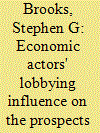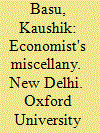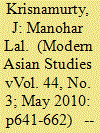| Srl | Item |
| 1 |
ID:
124397


|
|
|
|
|
| Publication |
2013.
|
| Summary/Abstract |
Political scientists and economists have long been interested in the role of special interests in the policymaking process. In the past few years, a series of important new books have argued forcefully that the lobbying activities of economic actors have an important influence on the prospects for war and peace. All of these analyses claim that whether economic actors enhance or decrease the likelihood of conflict ultimately depends on the domestic political balance between economic actors who have a strong vested interest in pushing for peace versus those that do not. I advance two contrary arguments. At least among the advanced states, I posit there are no longer any economic actors who will be favorable toward war and who will lobby the government with this preference. All of the identified mechanisms that previously contributed to such lobbying in these states have been swept away with the end of colonialism and the rise of economic globalization. In particular, I show that the current structure of the global economy now makes it feasible for foreign direct investment to serve as an effective substitute for conquest in a way that was not possible in previous eras. My second argument concerns those economic actors in advanced states with a preference for peace. I posit that it has become unnecessary for them to directly lobby the government to avoid war on economic grounds because economic globalization-the accumulation of decisions by economic actors throughout the globe-now has sufficiently clear economic incentives for leaders.
|
|
|
|
|
|
|
|
|
|
|
|
|
|
|
|
| 2 |
ID:
104832


|
|
|
|
|
| Publication |
New Delhi, Oxford University Press, 2011.
|
| Description |
ix, 200p.
|
| Standard Number |
9780198072508, hbk
|
|
|
|
|
|
|
|
|
|
|
|
Copies: C:1/I:0,R:0,Q:0
Circulation
| Accession# | | | | | | | | | | | |
| 056071 | 330.1/BAS 056071 | Main | On Shelf | General | | | | | | | |
|
|
|
|
| 3 |
ID:
095249


|
|
|
|
|
| Publication |
2010.
|
| Summary/Abstract |
Manohar Lal was an outstanding student of Alfred Marshall, a highly respected teacher, a successful lawyer-politician and a very able provincial Minister of Finance. The focus, in this paper, is on his stay in Cambridge until 1906, his career in India as an economist and as a lawyer and politician in the Punjab until 1945. I argue that his work in economics was not marked by great originality. His achievements were to have been a good teacher, to have successfully competed with British students and to have established close personal links with the British academic community. In politics, while he did not have a political base and was a scholar among politicians, he held high office with great competence. I believe he was one of the select groups of Indians who provided an inspiration to others by showing that Indians could compete successfully with the best from any country at the highest level.
|
|
|
|
|
|
|
|
|
|
|
|
|
|
|
|
| 4 |
ID:
138212


|
|
|
|
|
| Summary/Abstract |
Russian policymakers and economists are concerned about the possible dire consequences of the sharp drop in oil prices. I would like to share some little-known facts showing that the price component has always been the weakest point in Russian energy policy, and propose some measures that may help overcome this trend, which is dangerous to Russian interests.
|
|
|
|
|
|
|
|
|
|
|
|
|
|
|
|